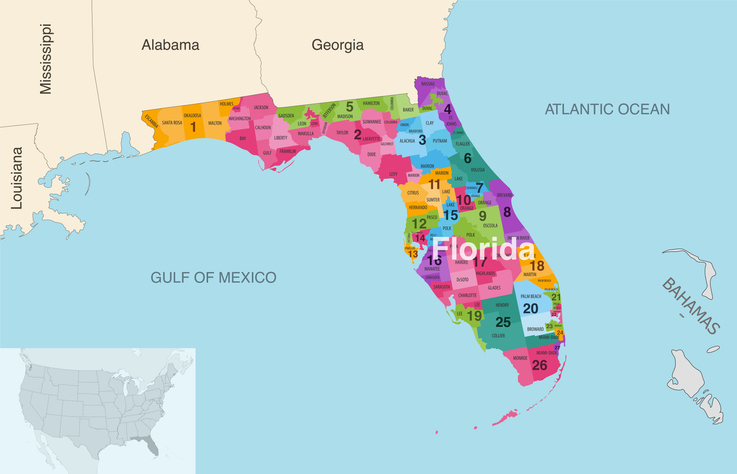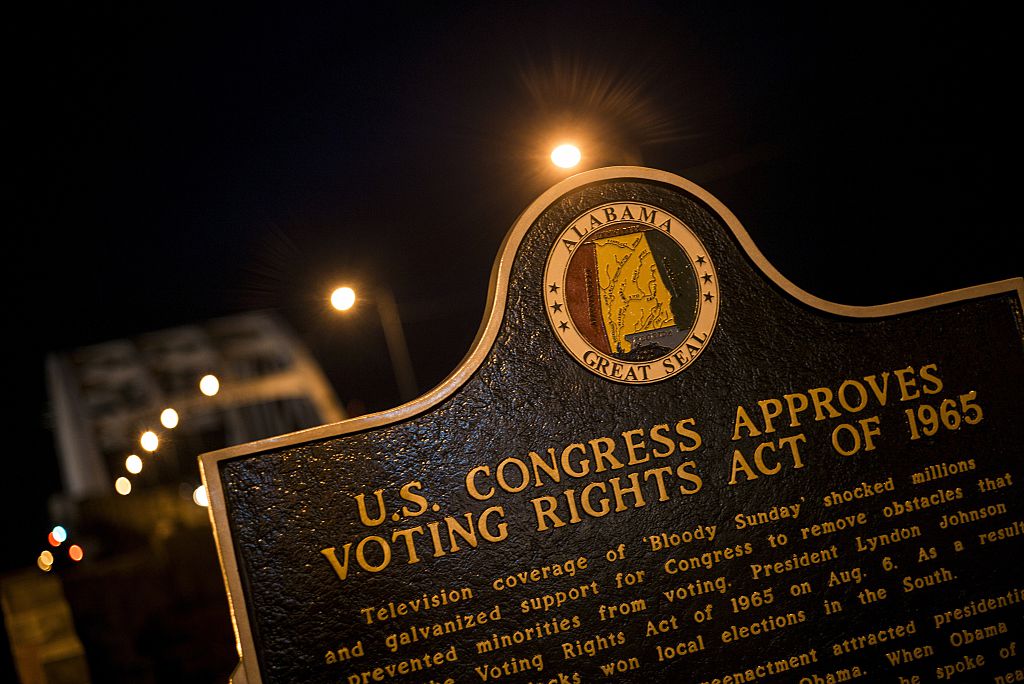Florida Congressional Map: DeSantis' Racist Voting Plan Approved
Federal Judges Rule Florida Gov. Ron DeSantis’ ‘Race-Neutral’ Congressional Map Is Constitutional

Source: brichuas / Getty
In today’s episode of This Is Why Critical Race Theory Exists, three federal judges ruled Wednesday that plaintiffs have not proven that Florida Gov. Ron DeSantis and the Florida Legislature did not redistrict the state’s congressional map for a “racially discriminatory purpose,” despite DeSantis all but admitting it was done for the purpose of diluting Black voting power in a particular district.
According to CBS News, it was the second time in less than four months that courts have upheld a redrawn map of a North Florida district that elected a Black Democrat in the past. In 2022, DeSantis announced a proposal to rearrange the congressional map to “have North Florida drawn in a race-neutral manner.” The Tampa Bay Times reported at the time that “DeSantis said the current Congressional District 5, which stretches across North Florida from Tallahassee to Jacksonville, linking urban and rural Black voters in a region that was home to the slave plantations of the 1800s, ‘divvies up people based on the color of their skin.’”
So, DeSantis decided that a map that was drawn to end historic anti-Black discrimination in a particular region of Florida was racist against white people because it had too many black voters linked in one district. He essentially practiced the legislative version of white police officers seeing too many negroes gathered in one place and saying, “OK, break it up, guys! Move along, all of you!”
But apparently, DeSanits’ own admission that he changed the map for race-based purposes wasn’t enough to prove he acted with a “racially discriminatory purpose.”
From CBS:
The federal court lawsuit, filed by plaintiffs such as Common Cause Florida and the Florida NAACP, alleged that the map involved intentional discrimination and violated the U.S. Constitution’s 14th Amendment and 15th Amendment. The 14th Amendment ensures equal protection, while the 15th Amendment prohibits denying or abridging the right to vote based on race.
But Wednesday’s opinion shared by Judges Adalberto Jordan, Casey Rodgers and Allen Winsor said the plaintiffs had not met a key test of showing that the Legislature acted with racial motivation.
“There are two relevant state actors in this case – the Florida Legislature, which passed the enacted map, and the governor, who proposed, pushed for, and signed the enacted map into law,” the opinion said. “It is not enough for the plaintiffs to show that the governor was motivated in part by racial animus, which we will assume without deciding for purposes of our decision. Rather, they also must prove that the Florida Legislature itself acted with some discriminatory purpose when adopting and passing the enacted map. This they have not done.”
I’m sorry—back that up a bit.
Did the judges really rule that it’s “not enough for the plaintiffs to show that the governor was motivated in part by racial animus” in a case about whether or not the governor discriminated on the basis of race? It appears that because no one else representing the entire state legislature came right out and said they were changing the map to make it “race-neutral,” it can’t be proven that separating Black voters was the primary focus.
In fact, according to the judges, the “plaintiffs freely concede there is no direct or circumstantial evidence of racially discriminatory purpose on the part of any member of the Florida Legislature.”
The North Florida district, Congressional District 5, in the past elected Black Democrat Al Lawson. The former configuration of the district stretched from Jacksonville to Gadsden County, west of Tallahassee, and incorporated areas with sizable numbers of Black voters.
DeSantis vetoed a redistricting plan passed by the Republican-controlled Legislature and muscled through a replacement that placed District 5 in the Jacksonville area. White Republicans won all North Florida congressional seats in the November 2022 elections.
It’s also interesting that at least one judge of the three on the panel said flat out that he did believe the governor acted with racist intent, but, somehow, he still isn’t racist.
“The evidence presented at trial convinces me that the governor did, in fact, act with race as a motivating factor,” Judge Jordan wrote.
“I do not think that Governor DeSantis harbors personal racial animus toward Black voters,” he continued. “But I do believe that he used race impermissibly as a means to achieve ends (including partisan advantage) that he cannot admit to.”
First of all, tell all the Black people who were thrown in jail in 2022 just for registering to vote while ineligible unbeknownst to themselves that DeSantis doesn’t harbor “personal racial animus toward Black voters.” Beyond that, Jordan appears to have argued that DeSantis using his position to exploit racism doesn’t make him racist, which really makes it seem like everyone involved in this case but the plaintiffs has an absurdly poor understanding of how systemic racism operates even when it’s operating right in their faces.
To be fair, Jordan’s summation was better than Winsor’s, which denied racism was a factor at all and essentially said, “Whateva, the Governor can do what he wants!”
“Florida governors, like United States presidents, routinely use their legislative authority to advance their policy goals, just as legislators do.” Winsor wrote. “Plaintiffs call the governor’s insistence here ‘bull(ying) the Legislature.’ Others might call it exercising political will. But one shouldn’t call it racist.”
This is as good a time as any to remind you all that critical race theory is an academic framework that allows us to critically examine long-standing systems in America, such as the legal and political systems, through the lens of race to determine how different racial groups are affected by them—and the people who oppose CRT the most are the same ones who consistently prove its validity.
SEE ALSO:
Super Tuesday Voter Suppression Suspected In Alabama’s Newly Drawn Black Voter District
Louisiana Becomes Latest State To Create New Majority-Black Voting District
















